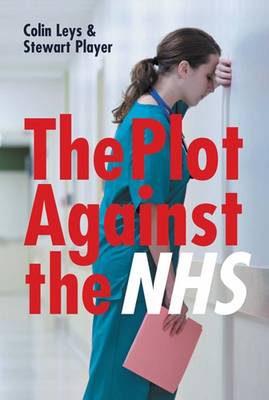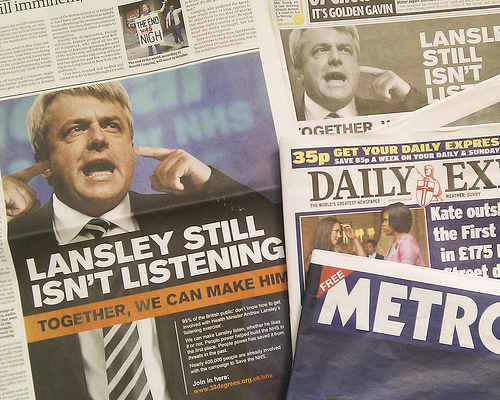Nick Clegg lies about the NHS
 Nick Clegg has made a deceitful and evasive speech on the NHS. Deceitful since he suggests that all will be well and hiding the fact that the Destroy the NHS bill is intended to reduce the scope of the NHS. Evasive by avoiding any mention of privatisation or the role of private providers. It’s a feel-good speech intended to reassure people that everything is OK, that there is no need to worry, that he, Cameron and Lansley can be trusted to look after the NHS. The lying, evil sods.
Nick Clegg has made a deceitful and evasive speech on the NHS. Deceitful since he suggests that all will be well and hiding the fact that the Destroy the NHS bill is intended to reduce the scope of the NHS. Evasive by avoiding any mention of privatisation or the role of private providers. It’s a feel-good speech intended to reassure people that everything is OK, that there is no need to worry, that he, Cameron and Lansley can be trusted to look after the NHS. The lying, evil sods.
We know from the experience of tuition fees and V.A.T. that Nick Clegg is a shameless liar. We know that he lies to decieve people. We know that he’s a slippery shit in the tradition of UK politicians.
Some of the lies and evasions I pulled from his speech today:
“When Beveridge first proposed a nationalised health service in 1942, he didn’t prescribe exactly how it should work.
He called for a comprehensive service to ensure every citizen can get “whatever medical treatment he requires in whatever form he requires it.”
Care, free at the point of use, based on need and not ability to pay.
No government worth its salt – certainly, no government of which I am a part – will ever jeopardise that.”
That’s a lie. The current coalition government – of which Clegg is a part – is intending to do away with a comprehensive health service free at the point of use.
“The comfort of knowing that the NHS will always be there for you.
If you’re in an accident, if you get ill, if your family need treatment.
And it will always be free. No bills, no credit cards, no worries about money when you’re worrying about your health.
That’s why I have been absolutely clear: there will be no privatisation of the NHS.”
There are a few lies here.
Firstly, GP consortia will commission services. They decide which services will be available. With cuts to spending they will cut the range of services available. There will also be some expensively ill people that will likely not have a GP. This means that the NHS will not “always be there for you”.
Secondly, perhaps not an outright lie but certainly intended to mislead and give a fase impression: “it will always be free …”. No it won’t always be free. If you need a treatment that is not provided by your local GP commissioning group, you will have to pay or go without.
Thirdly, again perhaps not an oughtright lie:“there will be no privatisation of the NHS”. There will be private provision of services not offered by a reduced NHS. There will be private providers within the NHS. It will not be wholly privatised but there will be hugely increased involvement of private providers.
Clegg continues by saying “The NHS has always benefited from a mix of providers, from the private sector, charities and social enterprises, and that should continue.”
Notice what’s missing? The public sector. Is he saying that the public sector should not continue to play a role in the NHS?
Charities and social enterprises are private providers in a sense. They certainly are not public sector.
“People want choice: over their GP, where to give birth, which hospital to use.
But providing that choice isn’t the same as allowing private companies to cherry-pick NHS services.
It’s not the same as turning this treasured public service into a competition-driven, dog-eat-dog market where the NHS is flogged off to the highest bidder.”
Choice. People don’t really want choice. They want a good service that doesn’t unduly inconvenience them e.g. having to travel to a distant hospital.
Clegg is deliberately misconstruing the argument, putting up a straw-man by saying that the NHS will not be sold off to the highest bidder. It’s about providing a restricted health service where you will have to pay – or go without – services that are not provided.
[27/5/11 edit: It’s also the first stage in the process of privatisation and transition to a private insurance-based health service on the US model.]
“I’ve heard people suggest that our reforms could lead to politicians washing their hands of our health services, because of the way the Bill is phrased.
So we need to be clearer – the Secretary of State will continue to be accountable for your health services.
This is your NHS; funded by your taxes and you have a right to know there is someone at the very top, answerable to you. With a public duty to ensure a comprehensive health service, accessible to all.”
Clegg is employing the worn-out argument that they have failed to properly explain the proposed changes. The truth is that the more people understand, the more they object.
He’s defending the Health Secretary no longer being responsible for providing the health service, arguing against what Colin Leys said ‘The bill removes the secretary of state’s responsibility to provide a national health service and doesn’t assign it to anyone else. She or he would only be charged with “promoting” it.’
Clegg suggests that this is merely phrasing when it is crucial. If it is only a matter of phrasing, then we’ll have the phrasing that the Health Secretary will provide a health service.
“opening up”…
Clegg is defending the Bill to abolish the NHS contrary to the instruction of his Spring Conference. He needs to be dumped asap.


